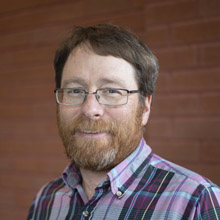

Shan Hays PhD
Professor of Biology
Contact Information
Academic Divisions
Natural & Environmental Sciences DepartmentEducation
PhD., University of Oregon, Biology, 2001BA, University of Colorado Boulder, Biochemistry, 1994
BA, University of Colorado Boulder, Molecular, Cellular and Developmental Biology, 1994
Biography
My roots in Colorado run back five generations and into the 19th century. I was raised on a farm/ranch in far eastern Colorado where I developed a keen interest in the natural world. I decided that the field of genetics has the best approach to understanding life, so I studied biology at CU-Boulder. I continued my studies in graduate school at the University of Oregon, where I was involved in some of the first studies to elucidate the molecular mechanisms underlying the then-mysterious subject of epigenetics. I also married, and our family grew by three as we moved from Oregon to Fresno, California, and then to Gunnison. During this time, I discovered the joy of teaching others about the wonders of molecular biology, which led my wife and me to seek out a quality teaching university where we could work. Raising our kids in our native Colorado and near family while living in the beautiful Gunnison country has been an amazing experience.
How did you discover Western?
I attended the Academic Decathlon state finals at Western when I was a high school student. Although I did not attend Western, I was intrigued by it and sought employment here after I got my PhD.
What are some of the highlights of your career?
Watching students blossom in college and then be successful post-graduation.
What most excites you about your field?
Advances in molecular biology and epigenetics are allowing us to better understand life at its most basic level. It is an amazing time to be a part of this field.
What is your favorite thing about the Gunnison Valley?
The wonderful mix of people who live in this beautiful slice of heaven.
Courses Taught
- Biochemistry I and II
- Biological Principles (and Lab)
- Biotechnology
- Cell Biology (and Lab)
- Cell Biology Enhancement
- Chromatin and DNA Repair
- Chromosome Structures
- Epigenetics
- Epigenomics
- Genes in Society
- Genetics (and Lab)
- Genome Analysis
- Introduction to Organic Chemistry and Biochemistry (and Lab)
- Living Planet
- Mechanisms of Aging
- Meteorology
- Molecular Biology
- Nature of Science
- Organic Chemistry I and II (and Lab)
- Scientific Writing
- Translation Inhibitors
Office Hours
Tuesdays 9:30 – 11 am and 2 – 4 pm; Thursdays 9:30 – 11 am
Research Interests
Using genetic and biochemical techniques, we examine the role chromatin (the heterogenous complex of DNA, RNA, and proteins that make up chromosomes) plays in centromere formation and gene expression in the simple eukaryotic model organism Neurospora crassa. To determine its role in centromere formation, we delete a centromere and examine neocentromeres that subsequently form. To determine its role in gene expression, we correlate protein binding in a gene’s promoter with the gene’s expression level in different genetic backgrounds that are missing chromatin factors or have modified forms of those factors.
Some of my research students are also examining the dot chromosome of various species of Drosophila fruit flies as part of the Genomics Education Partnership. They generate high-quality finished sequences from raw sequence data and annotate genes and other features to facilitate an evolutionary approach to understanding the dot chromosome’s atypical chromatin structures and gene expression patterns.
Publications:
- Hays SM, Swanson J, Selker EU. Identification and characterization of the genes encoding the core histones and histone variants of Neurospora crassa. Genetics. 2002 Mar;160(3):961-73.
- Hays SM and Selker EU. Making the selectable marker bar tighter and more economical. Fungal Genetics Newsletter. 2000 Aug;47:107.
- Klocko AD, Rountree MR, Grisafi PL, Hays SM, Adhvaryu KK, Selker EU. Neurospora importin α is required for normal heterochromatic formation and DNA methylation. PLoS Genetics. 2015 Mar;11(3):e1005083. doi:10.1371/journal.pgen.1005083
- Jo Handelsman, David Asai, Sarah Elgin, Mica Estrada, Shan Hays, Tracy Johnson, Sarah Miller, V Mingo, Christopher Shaffer, Jason Williams; A Critical Step Toward Diversifying STEM: Fix the Classrooms. Science 376:1057-1059 (2022) doi: 10.1126/science.abn9515
- Sarah C.R. Elgin, Shan Hays, Vida Mingo, Christopher D. Shaffer, and Jason Williams; Building Back More Equitable STEM Education: Teach Science by Engaging Students in Doing Science posted to BioRxiv 6/1/2021, doi: 2021.06.01.446616v1